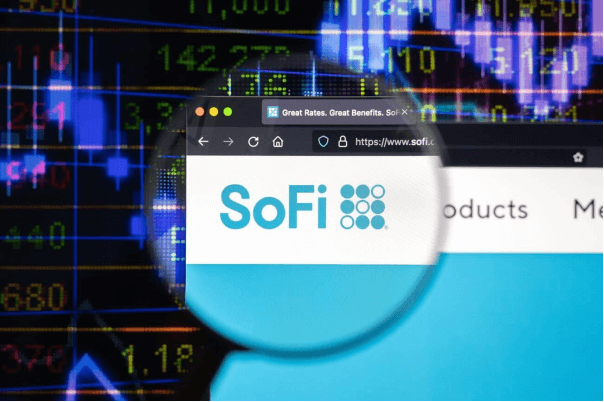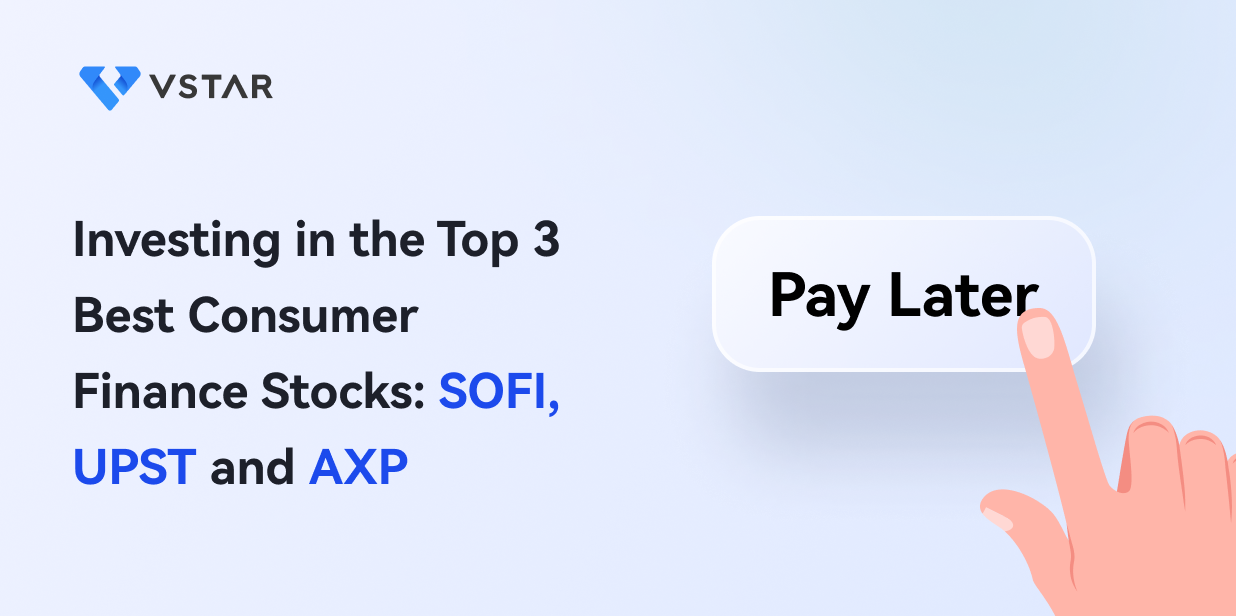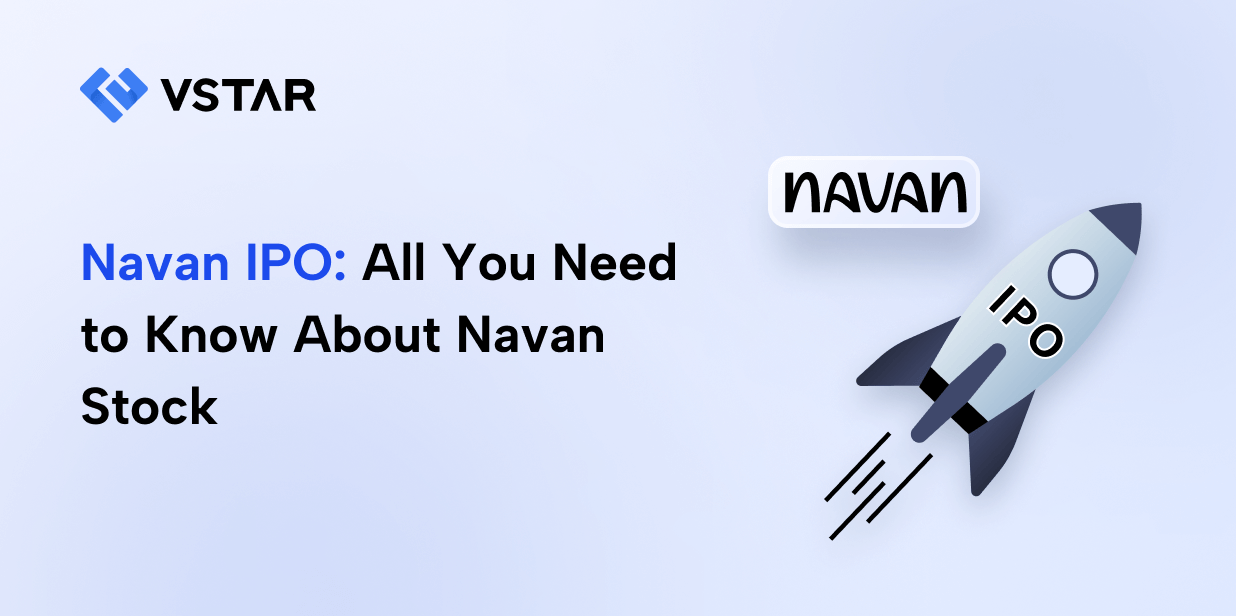If you want to grow your money and diversify your portfolio, consider investing in consumer finance stocks. Consumer finance is a fast-growing industry that provides various financial products and services to individuals and households. These include student loan refinancing, mortgages, personal loans, credit cards, and wealth management. Consumer finance companies use technology and innovation to offer solutions that meet consumers' diverse needs and preferences. In this article, we will introduce and compare three of the top consumer finance stocks to invest in 2023: SoFi Technologies Inc (NASDAQ: SOFI), Upstart Holdings Inc (NASDAQ: UPST), and American Express Co (NYSE: AXP). We will also explain how to trade consumer finance stocks CFD with VSTAR, a global regulated trading platform that offers low fees, deep liquidity, and user-friendly features.
SoFi Technologies Inc (NASDAQ: SOFI) - Next-Gen Lending Platform With High-Growth Potential
SoFi is an online personal finance company that offers a variety of products and services to help people achieve financial independence. These include student loan refinancing, mortgages, personal loans, credit cards, and wealth management. SoFi got founded in 2011 by four Stanford graduates who wanted to provide a better alternative to traditional banks. Since then, SoFi has grown to serve over 5.7 million members and has originated over $6 billion in loans.
SOFI stock went public in June 2021 through a merger with a special purpose acquisition company (SPAC) called Social Capital Hedosophia Holdings Corp V. The deal valued SoFi at $8.65 billion and raised $2.4 billion in cash for the company. Since then, SOFI stock has been volatile, with a price of $7.48 as of June 6, 2023, up 73.15% from the previous six months. The stock has a consensus price target of $7.46 and a buy rating from most analysts.

Source: Alam
SOFI’s financial performance has been impressive, especially amid the COVID-19 pandemic. The company reported revenue of $472 million in Q1 2023, up 43% year-over-year. The company also achieved a positive adjusted EBITDA of $76 million in Q1 2023, compared to a loss of $9 million in Q1 2022. SOFI’s revenue growth has outpaced LendingClub, which reported a decline in revenue of 6% year-over-year in Q1 2023 but trailed behind Upstart and Affirm, which reported revenue growth rates of 90% and 67%, respectively, in Q1 2023. SOFI has maintained its leadership position in the personal loan market but faces increasing competition from other fintech players in the home loan and student loan segments. SOFI’s profitability has also improved significantly, as the company reduced its net loss from $110 million in Q1 2022 to $34 million in Q1 2023. SOFI’s return on equity and return on assets were -4.41% and -1.41%, respectively, compared to LendingClub’s 25.26% and 1.22%, Upstart’s -35.99% and -8.65%, and Affirm’s -37.97% and -10.29%. SOFI has demonstrated strong growth and resilience in a challenging market environment but still has room to improve its efficiency and profitability compared to its leading competitors.
Upstart Holdings Inc (NASDAQ: UPST) - AI-Powered Lending Platform Revolutionizing Consumer Credit
Upstart is an online lending marketplace that uses artificial intelligence and machine learning to provide more accurate and fair credit decisions. Upstart considers more than 1,600 data points, such as education, employment, and income, to assess the creditworthiness of borrowers. In 2012, Upstart got founded by former Google employees who wanted to use technology to improve access to credit and reduce the cost of borrowing. Upstart partners with banks and credit unions to offer personal, auto, and education loans.
UPST stock debuted on the Nasdaq in December 2020 with an initial public offering (IPO) price of $20 per share. The stock soared more than 120% on its first trading day, valuing the company at over $2 billion. Since then, UPST stock has continued to rally and stands at $28.23 as of June 6, 2023, up 64.8% from the previous six months. Upstart stock has a consensus price target of $12.81 and a sell rating from most analysts.
UPST’s financial performance has been challenging, especially amid the COVID-19 pandemic and macroeconomic headwinds. The company reported revenue of $103 million in Q1 2023, down 67% year-over-year. The company also reported a net loss of $129 million in Q1 2023, compared to a net income of $33 million in Q1 2022. UPST’s revenue decline has lagged behind its industry peers and competitors, such as LendingClub, SoFI, and Affirm, which reported revenue growth rates of 0.5%, 46.10%, and 7.40% in Q1 2023. UPST’s profitability has also deteriorated compared to its industry peers and competitors, as the company reported earnings per share of -$1.58, compared to SoFI’s -$0.05 and Affirm’s -$0.69. UPST’s return on equity and return on assets were -35.99% and -8.65%, respectively, which were worse than LendingClub’s 25.26% and 1.22%, SoFI’s -4.41% and -1.41%, and only better than Affirm’s -37.97% and -10.29%.
American Express Co (NYSE: AXP) - Stable Industry Leader Focused on Higher-Spending Consumers
American Express is a global financial services company that offers payment cards, travel services, rewards programs, and business solutions. American Express got founded in 1850 as an express mail business and later expanded into the financial sector. Today, American Express is one of the largest card issuers in the world, with over 70 million cards in force and over $357 billion in billed business.
AXP stock has been trading on the New York Stock Exchange since 1977 and is a component of the Dow Jones Industrial Average. The stock has been resilient despite the COVID-19 pandemic, recovering from a low of $67.00 in March 2020 to a high of $184.72 in November 2021. As of June 6, 2023, AXP stock closed at $167.43, up 8.23% from the previous six months. American Express stock has a consensus price target of $181.00 and a hold rating from most analysts.

Source: Unsplash
AXP’s financial performance has been strong, especially amid the recovery from the COVID-19 pandemic. The company reported revenue of $14.3 billion in the first quarter of 2023, up 22% year-over-year. The company also achieved net income of $1.8 billion in the first quarter of 2023, compared to $2.1 billion in the same period last year. AXP’s revenue growth has been higher than its industry peers and competitors, such as Visa, Mastercard, and Discover, which reported revenue growth rates of 11.1%, 11.2%, and -3.50% year-on-year. AXP’s profitability has also been solid, as the company reported earnings per share of $2.41 in the first quarter of 2023, compared to Visa’s $2.04, Mastercard’s $2.48, and Discover’s $3.58. AXP’s return on equity and return on assets were 29.90% and 3.35%, respectively, in the first quarter of 2023, compared to Visa’s 42.35% and 15.38%, Mastercard’s 154.10% and 21.33%, and Discover’s 29.74% and 3.43%.
Comparison of SOFI, UPST, and AXP
SoFi, Upstart, and American Express offer personal loans and other financial products and services. SoFi has the largest and most diverse customer base of over 2.9 million members, using its various products and services for personal finance needs. SoFi also has a diversified product portfolio, a technology platform Galileo, and a bank charter application. SoFi faces risks related to its business model, regulatory environment, and competition. For example, SoFi depends on third-party service providers and platforms for its operations and products, which may expose it to operational and reputational risks. SoFi also relies on a gain-on-sale origination model, which may materially alter its net revenue depending on market conditions and consumer demand.

Source: Unsplash
Upstart has a smaller but growing customer base of over 1.3 million borrowers using its platform to access personal, auto, and education loans. Upstart also has a proprietary AI lending model, a network of bank partners, and an expansion into new loan categories. Upstart faces risks related to its technology, growth strategy, and industry dynamics. For instance, Upstart needs to maintain and improve its AI lending model and platform, which may require significant investments in research and development. Upstart also depends on bank partners and loan originators for its revenue and loan volume, which may subject it to regulatory and contractual risks.
American Express has a massive and loyal customer base of over 112 million cardholders who use its cards for spending, borrowing, and rewards. American Express also has a closed-loop network model, a premium card portfolio, global merchant relationships, and a loyal customer base. American Express faces risks related to its market position, customer behavior, and macroeconomic factors. For example, American Express competes with other payment networks and fintech companies that may offer lower fees or more innovative solutions. American Express also depends on higher-spending customers and merchants for its revenue and profitability, which may be affected by changes in consumer preferences or economic conditions.

Source: Unsplash
As of June 6, 2023, American Express had the highest market cap of $124.44 billion, followed by SoFi with $7.04 billion and Upstart with $2.33 billion.
How to Invest in Consumer Finance Stocks
If you are interested in investing in consumer finance stocks, you might wonder how to do it. There are three main ways to invest in consumer finance stocks: holding the share, buying an option, or trading a CFD. Let’s compare these methods and see which one suits you best.
Holding the Share
Holding the share means buying and owning the stock of a consumer finance company. This way, you can benefit from any increase in the stock price and receive dividends if the company pays them. However, holding the share also means you must pay the full price of the stock upfront, which can be expensive for some stocks. You must also pay commissions and fees to your broker and taxes on your capital gains and dividends.
Buying an Option
Buying an option means purchasing a contract that gives you the right, but not the obligation, to buy or sell a stock at a specified price within a specified period. This way, you can profit from the stock's price movements without owning it. However, buying an option also means paying a premium for the contract, which can reduce your profit margin. You must also know the option's expiration date and the stock price's volatility.
Trading a CFD
Trading a CFD means trading a contract for difference, an agreement between you and your broker to exchange the difference in the stock value between when you open and close your position. This way, you can trade on margin, meaning you only need to deposit a small percentage of the trade's full value. You can also trade long and short positions, which means you can profit from rising and falling prices. However, trading a CFD also means that you must pay spreads and overnight fees to your broker and are exposed to leverage risk, which can magnify your losses and profits.

Source: Unsplash
To illustrate how you can trade consumer finance stocks CFDs with VSTAR, here's an hypothetical example based on the stock prices as of June 6, 2023.
You believe that SoFi’s stock price will rise in the future due to its diversified product portfolio and bank charter application. You decide to buy 100 CFDs on SOFI at $7.48 per share, with a 10% margin requirement. This means you only need to deposit $74.80 as the initial margin. You also set a stop-loss order at $6.50 and a take-profit order at $9.00. If the stock price rises to $9.00 and your take-profit order gets triggered. You close your position and make a profit of $152.00, minus the spread and overnight fees.
Among these three methods, trading a CFD might be the best option if you are looking for a flexible and cost-effective way to invest in consumer finance stocks. And if you are looking for a reliable and user-friendly platform to trade consumer finance stocks CFDs, you might want to consider VSTAR.
VSTAR is a global regulated trading platform with low fees, deep liquidity, and user-friendly features. With VSTAR, you can trade CFDs on over 1,000 markets, including currencies, stocks, indices, gold, and oil. You can also enjoy the following benefits:
Lowest Trading Fee: VSTAR charges zero commission and super-tight spreads to help you get more profit
Deep Liquidity: VSTAR provides reliable and super-fast order execution
Global Regulated and Secure: VSTAR is authorized and regulated by the Cyprus Securities and Exchange Commission (CySEC) and is a member of the Cyprus Investor Compensation Fund
User-Friendly App: VSTAR has an easy-to-use interface that allows you to trade with a minimum deposit of only $50, catch trading opportunities on the popular real-time markets, and explore $100,000 risk-free demo accounts


To start trading consumer finance stocks CFDs with VSTAR, all you need to do is follow these simple steps:
● Download the VSTAR app from Google Play or App Store
● Register with your email address or phone number
● Verify your identity by uploading your ID card or passport
● Deposit funds using your preferred payment method
● Choose a consumer finance stock from the list of available markets
● Open a long or short position depending on your market view
● Close your position when you reach your desired profit or loss level
Consumer Finance Stocks Trading Tips
Do your research:Before you trade any consumer finance stock, it would be best to do your homework and learn about the company’s business model, financial performance, competitive advantages, growth prospects, and risk factors. You should also keep up with the latest news and developments in the consumer finance industry and the broader economy that might affect the stock price.
Use technical analysis:Technical analysis studies price patterns, trends, indicators, and signals that can help you identify trading opportunities and entry and exit points. VSTAR’s app can access various technical analysis tools like charts, candlesticks, moving averages, and Fibonacci retracements.
Manage your risk:Risk management is the key to successful trading. You should always use stop-loss and take-profit orders to protect your capital and lock in your profits. You should also diversify your portfolio by trading different consumer finance stocks and other markets. Moreover, you should never risk more than you can afford to lose and avoid overtrading or emotional trading.
Conclusion
This article covered the consumer finance industry and the best consumer finance stocks to buy in 2023: SoFi stock, Upstart stock, and American Express stock. These companies offer consumers different financial products and services using technology and data. They also have different strengths, opportunities, and challenges in the market. We compared them based on their market position, growth potential, and investment potential.
The consumer finance industry is a fast-growing and innovative sector that offers many opportunities for investors. However, it also has many risks and uncertainties. To invest in consumer finance stocks, you should do your homework, use technical analysis, and manage your risk. You should also try trading consumer finance stocks CFDs with VSTAR.
Consumer finance stocks can be a great way to diversify your portfolio and benefit from the fintech revolution. If you are ready to invest in consumer finance stocks, start today with VSTAR!


















